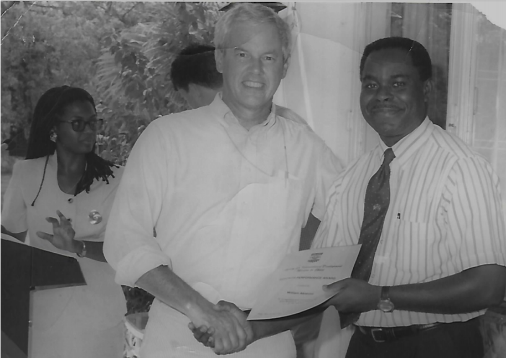As a young child, William Akiwumi received food assistance from the U.S. Government through USAID; now, as a Senior Agriculture Advisor with USAID’s Bureau for Africa, he works to promote agriculture-led economic growth and food security in Africa.
We sat down with William Akiwumi to learn more about his story, his nearly 30-year experience working with USAID, and his advice for those wanting to pursue a career in international development.
Tell us about your childhood, education, and what led you to a career in international development.
I was raised by my very loving parents in my family home near Jamestown in Accra. As a kid, I was very creative, curious and outgoing, though very shy. I attended public schools that were created during the first republic following Ghana’s independence in 1957.
The Government of Ghana’s Universal Primary Education (UPE) program ensured that all children of school age would have the opportunity to get an education. I found going to school quite boring, but my parents ensured I went to school by any means necessary!
Having been a recipient of international food aid as a kid, I decided to pursue higher education in agriculture to help Ghana become food secure and wean itself of food aid. After three years of comprehensive studies in agriculture at the University of Ghana, Legon, I earned a Bachelor of Science degree, with honors, in Agricultural Economics. I also hold an MBA from the University of Maryland.
When did you first become aware of USAID?
I was exposed to USAID and international development very early in my life. During my elementary education, the United States Government provided complementary food assistance to school children in Ghana, following the founding of USAID under the U.S. Foreign Assistance Act of 1961. Elementary school children, including me, received wheat, vegetable oil and milk powder in packages bearing the USAID logo. The USAID logo and the food assistance stuck with me throughout my youth.
What motivated you to join USAID?
Many of my university professors were trained in U.S. universities under a USAID human resource development assistance program that offered Ghanaian agriculture graduates the opportunity to undertake master’s degrees and doctoral studies at U.S. universities. Therefore, during my agriculture studies, I was exposed to Ghanaian, United States and international agricultural development policies and practices. Subsequently, I was employed as an Assistant Project Manager for the USAID/Ghana-funded Managed Input Delivery and Agricultural Services (MIDAS) Project in 1981.
MIDAS was a small farmer development project funded under a USAID Government-to-Government (G2G) grant to the Government of Ghana. During my time working on this project, I experienced firsthand the importance of international development and cooperation in agriculture.
In 1991, I joined the U.S. Embassy in Accra, where I worked as an agricultural specialist in the Office of Political and Economic Affairs. In this role, I helped U.S. agricultural exporters expand sales in Ghana and other West African markets. I joined USAID in September 1992, to pursue my international development interests when USAID launched a flagship private sector-led Trade and Investment Program (TIP) that sought to diversify and increase Ghana’s agricultural exports. I joined the economic growth team in the USAID Mission in Ghana, serving as an agricultural economist, senior program management specialist, and mission environment officer during my 9-year tenure with the Mission.
Since moving to the United States in 2001, I have worked for the USAID Bureau for Africa’s Office of Sustainable Development as a program analyst, agriculture advisor, and currently, the senior agriculture advisor in the Economic Growth, Environment and Agriculture division. During this period, I provided support to the Africa Bureau and missions for the development and implementation activities under the Agency’s Initiative to End Hunger in Africa; the Global Hunger and Food Security Initiative, Feed the Future; and the follow on Global Food Security Strategy.
What lessons have you learned while working for USAID?
Providing international development assistance is the moral and right thing to do—to help people in need around the world. The big lesson for me is that, to bring about peace throughout the world, people need to be able to develop their potential and stand on their own. Our assistance helps many people achieve their potential and live in dignity. The full engagement of host country leadership in the design and implementation of development assistance programs can lead to lasting impact. Investment in international development also increases American prosperity. It provides expanded access to global markets for U.S. businesses, while promoting peace at home and overseas.
Do you have advice for individuals interested in the international development career path?
A career in international development requires passion for humanitarian and/or development work. You must also have an interest in helping people and bettering livelihoods, including improving and sustaining health and nutrition, education, conflict and peace-building, governance and human rights, poverty reduction, or any of the many humanitarian and development challenges that the world is facing.
International development is challenging, but it is a very rewarding career. No matter where you work, the important thing to remember is your purpose, and your passion. You must have a passion for the mission.
For 60 years, with the help of passionate workers like William Akiwumi and on behalf of the American people, USAID has advanced global food security by helping families and individuals meet their need for a reliable source of quality food and sufficient resources to produce or purchase it. By addressing the root causes of hunger, USAID is increasing economic opportunity and growth among vulnerable communities.
Source : GHANAEBASSAY


